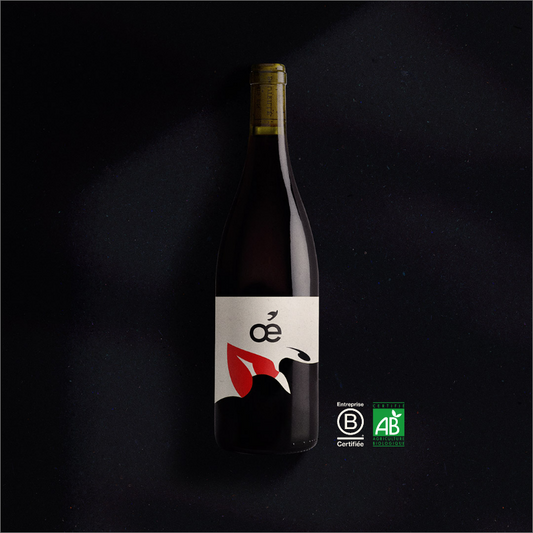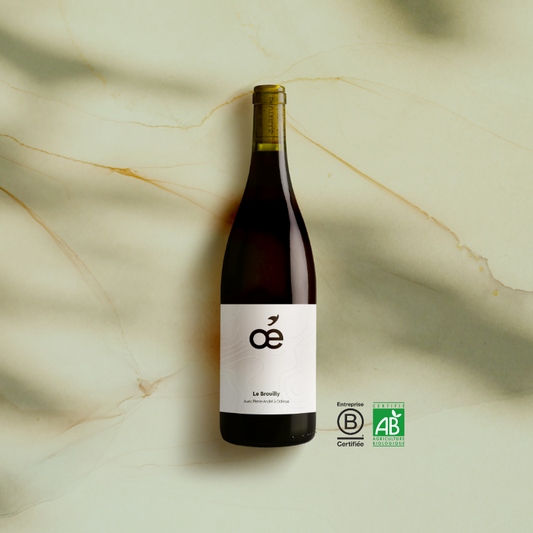Following our mission to bring about transformation by making agriculture, consumerism and business a force for good, we have to lead by example.
Leading by example means everything and nothing. Do our winemakers live by candlelight and eat only grapes? Or do our two co-founders, Thomas and Fx, dig the manure that helps regenerate the vines? No. Setting an example means putting our values on the table, surrounding ourselves with aligned partners who also want to bring about change, and always pushing ourselves to do more.
We work with several different companies who help us reach this objective: Biomède, EcoFarms and MiiMOSA.
Ready to hop aboard our tractor to learn more?
A unique biodiversity program
We set up the Oé Biodiversity Program two years ago. How does it enable us to make a difference? Through the program, we raise awareness among our winemakers by offering soil analysis and helping to monitor the existing biodiversity along their vines.
To finance the program, we donate 1% of our turnover to soil analysis with Biomede. We know that we don't have the same turnover as a large multinational, but you can fix that right away ;)
Working towards healthy soil with Biomede
Let's keep it simple. To make good wine, you need good grapes. To grow good grapes, good soil is incredibly important.
Unfortunately, some fifty years or so ago many winemakers sprayed copper – up to 50kg per hectare per year. Organic certifications are often criticized because of the presence of this copper, which in large quantities pollutes the soil, despite remaining authorized.
Today, the maximum authorized use is 4kg per hectare and per year. On average, Oé winemakers fall between 1.5kg and 2kg. That’s some 20 to 25 times less than before, and something we’re proud of.
If the vines were heavily treated with copper long ago, what remains in the ground today? How do we guarantee that neither the soil nor the wine will be contaminated?
We can’t forget that copper is an essential element in the soil to nourish plant growth – and soil has a "bioavailable" dose that’s consumed naturally. We really like beautiful grapes. It’s only when they have the same muscles as Lance Armstrong, we're less of a fan.
To give you some figures, it’s estimated that the soil must contain between 50 and 100 ppm (1 ppm = 1 part per million = 0.0001%) of copper for the soil to remain healthy, and for the vines’ consumption to be compensated by the copper brought in during the year.
This is where BIOMEDE comes in.
Biomede is the leader in the extraction of heavy metals from agricultural soils by plants, a process called phytoextraction. It took many years of research for them to design the ideal mixture of plants to extract heavy metals and develop a device that makes soil analysis easy.
It takes about 30 samples per hectare to have sufficient density and for the overall diagnosis to be accurate. Fx, our co-founder, put the theory to the test with Emmanuel, an Oé winemaker in the south of the Rhône Valley.
The instructions are simple: if the soil contains more than 200 ppm, hyper-accumulating plants should be sown between the rows of vines, i.e. plants that accumulate and assimilate more copper than others. They can be used as plant cover, then cut down and used again (either in the vines or elsewhere), and the copper in the soil will have decreased.
It’s estimated that this strategy makes it possible to reduce the amount of copper by 50 ppm at each planting, therefore each year.
It’s the start of regenerative viticulture. An agricultural philosophy that not just aims to take care not to degrade the soil but repairs the soil and restores all its fertility. Isn't that beautiful?
After multiple readings, Fx was proud to announce that Emmanuel’s soil contained between 100 and 150 ppm of copper. No need for hyper-accumulating plants. Yippee!
Initiatives and analysis with EcoFarms
Once the soils have been analyzed, we call on EcoFarms. They visit winemakers to audit their vineyards, carrying out an in-depth economic, societal and environmental analysis in order to optimize performance.
EcoFarms follow a winemaker for 4 months, allowing them to effectively measure their initiatives.
Here’s the EcoFarms analysis for Oé winemaker Denis, whose estate lies at the heart of the Rhône Valley. We can clearly see the three indices: economic, socio-geographic and agro-environmental. Denis' result is positive with a sustainability index of 64% (compared to 37% for comparable farms). Bravo, Denis!
After this top-level analysis, EcoFarms suggests actions that can be implemented to promote the development of biodiversity in the area.
We discuss these ideas with each winemaker and hear what they want to put in place. Often they want to build a big amusement park within their vineyard, with loops and rides… and we fight for them to build a big landing strip and airport. Just kidding. That was to see if you were still following. In reality, we discuss how they can make their land even more biodiverse as together we strive for a better world.
And to finance all this, on to… MiiMOSA!
Innovative funding campaigns with MiiMOSA
The MiiMOSA platform enables sustainable agriculture and food projects to be financed on a donation-with-reward or loan basis. With a conscience of the importance sustainable agriculture will play the future, the platform was created to facilitate ecological transition.
Thanks to our crowdfunding campaigns on MiiMOSA, we have been able to implement the initiatives proposed by EcoFarms to promote biodiversity.
We’ve launched two fundraising campaigns, the first with Franck and Véronique, Oé winemakers in Pujols, who produce our delicious red Bordeaux. They set out to develop agroforestry and increase the number of hedgerows on their land. Their goal was to create a balance between vines, the fauna, the flora, the trees and water.
The second campaign we launched was for Pascal and Nicolas, the Oé winemakers who produce our very popular Bordeaux Blanc. This crowdfunding campaign was for hedges, nesting boxes and little goats from the Pyrenees! Thanks to the campaign, Pascal and Nicolas have not just been able to take in the goats, but build them a sheepfold so that they can thrive in the great outdoors. It’s a good life.
(We’re sure even Pascal and Nicolas' goats ask for a sip of Bordeaux Blanc.)
Now you know everything we’re working on to make agriculture a force of good. And if you want to see how good the finished product tastes, order a bottle for yourself.
We’ll be back soon to unveil the rest of our mission…






